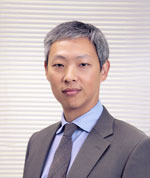Rodney Liu, winner of the IR Magazine award for best IRO in Taiwan 2012, talks to Candice de Monts-Petit
Rodney Liu is the sole member of the investor relations department at Taiwanese components major Delta Electronics, a situation he describes as ‘a one-man team – but not a one-man show. I get constant support from my colleagues in every department of the company. The finance division provides me with the figures, our PR team handles the announcements and I also work closely with the different business managers.’
At the top end of the C-suite, Yancey Hai, Delta’s former chief executive of eight years and current chairman, is also very much involved in rolling out the IR program. Hai reportedly dedicates 10 percent to 15 percent of his time to IR activities, a commitment that earned him IR Magazine’s best IR by a CEO award for Taiwanese companies in 2012.  ‘Our former chief executive understands the strategic importance of investor relations,’ confirms Liu. ‘He spent most of his career in the financial industry, so he knows the ecosystem of the investment community very well. He maintains a constant and consistent exposure to investors, hosting quarterly analyst meetings, attending investment forums and traveling abroad two or three times a year to meet major existing investors and potential ones.’
‘Our former chief executive understands the strategic importance of investor relations,’ confirms Liu. ‘He spent most of his career in the financial industry, so he knows the ecosystem of the investment community very well. He maintains a constant and consistent exposure to investors, hosting quarterly analyst meetings, attending investment forums and traveling abroad two or three times a year to meet major existing investors and potential ones.’
Liu handles the daily operations and communications in IR, responding to inquiries from investors, fund managers and analysts. He prepares all the data for the quarterly results meetings, which are chaired by the current CEO, Ping Cheng (the company’s former president for China operations).
Liu also travels extensively, attending between eight and 10 roadshows yearly in the US, Europe and Japan, and numerous conferences in Taipei, Hong Kong and Singapore – making a grand total of around 300 meetings a year.
Delta is 74 percent owned by foreign investors, making it the company with the second-highest foreign ownership level in Taiwan after TSMC. In Liu’s view, this is an advantage for Delta. ‘Taiwanese investors see this as a result of good practices,’ he says. ‘To them it means our IR is managed to a high standard, and we have a good reputation for protecting the interests of every stakeholder in the company.’
Good corporate governance has always been a high priority at Delta, and the company was a pioneer in Taiwan in implementing both corporate sustainability reporting and quarterly results announcements.
‘We always try to think long term and do things consistently so that, aside from macro uncertainties, our investors will feel comfortable holding on to our stock, without worrying too much about unexpected short-term drawbacks,’ Liu says.
For him, the best approach to disclosure is invariably candor: ‘It’s always better just to announce any bad news – and better to do it sooner than later.’ Indeed, Liu thinks credibility and accuracy are key to his good work. ‘The credibility of what we say is my top priority,’ he says.
‘I have to have total confidence in what I say, and if I’m not 100 percent sure I will let my interlocutor know.’ He reveals that, recently, investors have been mainly asking about the gross margin drivers for the next three to five years. ‘Our investors tend to be long term and they want to know the prospects for the next several years, not just the next quarter,’ he adds.
One challenge Liu has faced lately when speaking to investors is due – somewhat surprisingly – to the firm’s successful development and new improved business model, which saw Delta switch from being solely a components manufacturer to a systems solution provider.
‘It’s been increasingly difficult to explain the company’s businesses and strategy to investors because Delta’s commercial and organizational profiles are becoming increasingly complicated,’ he says.
Directional guidance
Another challenging task, according to Liu, is giving credible guidance, ‘especially after the financial tsunami that caused volatility to increase and business cycles to shorten.’ For this reason, the company does not give quantitative guidance.
‘In Taiwan, by regulation, companies like ours, which display a complicated composition of consolidated revenues, are not allowed to give any forward-looking numerical guidance on financial results,’ he explains. The company does, however, give directional guidance, regularly providing shareholders with updates, business by business, and on a timely basis.
‘Many of our peers give quantitative guidance but, from my perspective, helping analysts and investors understand what the company is facing and what we’re doing is much more important than the cold numbers,’ adds Liu.
‘After all, forecasts can hardly be consistently precise in this ever-changing world. Other factors, such as strategy, execution, management quality and dividend policy, among others, are much more important for long-term shareholders.’
Liu keeps an eye on sell-side analysts’ estimates to monitor market expectations and ‘sometimes to correct misperceptions,’ he says. ‘We use Bloomberg to retrieve consensus data, but do not publish analysts’ consensus figures.’
An essential aspect of Liu’s IR duties is gathering comments and suggestions on the business from investors. ‘This is something we truly value,’ he enthuses. ‘On some occasions I even encourage our major investors to send formal feedback letters to the board members or the chairman.’ Moreover, Liu sees one of his strategic responsibilities as being to ‘provide market intelligence and analysis based on investor feedback in order to supplement the company’s business and corporate governance strategies.’
To this end, Delta is planning to add another member to the IR team, whose role would be to focus on analytical work such as peer group analysis and market research, in order to examine ways in which the company could add more value to the business.
No stepping-stone to the board
The IR community in Taiwan has evolved dramatically over the past decade, going from embryonic to dynamic and led by numerous IR hires at prestigious large-cap firms. ‘Most large Taiwanese companies now have an IR person, and I see more and more smaller listed companies hiring IR professionals, or at least considering the option,’ confirms Liu. ‘This was quite rare even a few years ago.’
If being an IR professional in Taiwan is a higher-profile position than it once was, it is also a good way to get to know the different business units and to eventually make a move into one. In the mid to long term, Liu, who studied physics and business before working as a sales trader and a tech analyst, aims to get more involved in Delta’s strategic planning or make a move into the business side of things.
It’s certainly an ambitious plan, although Liu says he does not yet see an investor relations role as a stepping-stone to the board. ‘We are far behind the US in that,’ he concludes.
Career trajectory1993: Graduates from Taiwan’s National Chiao Tung University with a bachelor of engineering degree in electro-physics1996-1998: Gains MBA from the University of Rochester, New York 1998-2000: Works for brokerage houses National Securities and HSBC as a sales trader and tech analyst, and for Chinatrust Venture Capital as a tech analyst 2004: Joins Delta Electronics as IR manager |










